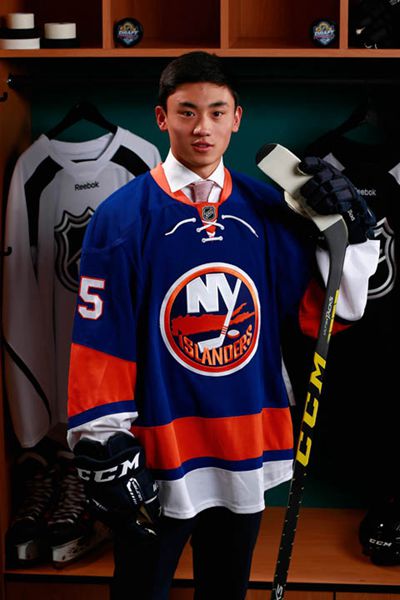
Song Andong.
 |
|
Song Andong. |
Song Andong's entry into the NHL is a natural result of the sport's budding popularity in Beijing, and it will also continue to fuel young players' enthusiasm for the sport.
The New York Islanders drafted Song Andong on June 27, as the first -ever Chinese player in the NHL, marking the most memorable day in the life of the 18-year-old young man.
Although Song may be unlikely to appear in the NHL rink in the near future, since drafted players need to wait until they are actually recruited, the young man has saw his name appear in many Chinese and international media reports overnight. Many reports referred to him as the "icebreaker" of hockey in China, as Song's entry into the NHL will significantly boost the popularity of the sport in his home country.
"Being the 'first' means great pressure, but it is also a motivation to make myself a better player," Song said, adding that he will join the Chinese hockey team both for the 2018 Pyeongchang Winter Olympics in South Korea and the 2022 Beijing Winter Olympics – if Beijing wins.
Song's hockey journey started with his childhood illness. In 2002, the five-year-old Song often suffered from throat irritation. The doctor advised him to "inhale more cold air," which is why his parents took him to the hockey rink.
Song showed great talent in 2003 when he met his first coach Fu Lei, who recalled the boy as "clever with a good physical condition and a clear mind during matches – fitting for playing hockey." The coach's conclusion proved correct. The young boy won the "Best Forward" prize in a children's international invitational when he was seven years' old, and led his team to win the Bell Capital Cup when he was nine.
Song's family moved to Canada when he was 10, and there in Ontario he joined the Oakville Rangers. During his five years in Canada, Song played at more than 80 games in a single season. He was also selected to play for the Lawrenceville School in New Jersey. Earlier this year, he went to Phillips Academy in Andover, Massachusetts, then he will move on to college ice hockey. Song has represented China internationally as captain of the Chinese National Team at the 2014 and 2015 IIHF World Under-18 Championships.
Commenting on the young man's growth, Fu Lei said Song's draft into the NHL was "a natural result when the conditions are ripe." He noted that there were fewer than 100 kids playing hockey in Beijing when Song started to learn it, but the number of registered young hockey players is more than 2,000. "Having a Song Andong arising from them is nothing but natural," said the coach.
Song's growth mode is "repeatable" for other Chinese players as well as China's national team, said Yu Tiande, leader of China's National Hockey Team. He said hockey in China was underdeveloped; players generally lack match experience. But Song, who plays and trains in North America, has a first-hand understanding of how hockey is played in mature leagues. "Such knowledge is Song's wealth and also a source of wealth for Chinese hockey," said Yu.
Song's entry into the NHL also reflects the league's intention to seek more market opportunities in China. Song's rise will have profound implications for hockey in China.